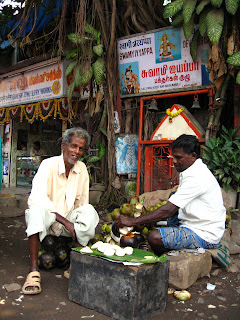
After a significant respite from these bloglines, this scribe is now back at the silver-tinged keyboard. I arrived three and a half weeks ago in Mumbai and have been settling down here since then to do research on caste mobility issues in this metropolis as part of a Fulbright grant. I am doing my project in conjunction with folks at the Tata Institute of Social Sciences. Before I jump into issues of vital concern to the subcontinent, I will devote a few paragraphs to thoughts I contemplated over the course of the past few months...
Burning Man Redux
Although I enjoyed a highly transformative experience at last year's Burning Man, I did not have the opportunity to attend the 2007 event at Black Rock City in the northwestern corner of Nevada. Ultimately, this year I am better off not having invested the spiritual, fiscal, and physical resources necessary to participate in the festival of countercultural self-reliance and psychedelic madness. I decided that, after having listening to accounts by several friends who did indeed make it to the playa, that my virgin burner experience was more or less like a virgin sex fling or a virgin cocaine ride. The first time always seems to be the most supreme. Two virgin burners reported times of their lives, much the same as I experienced last year. However, a trustworthy 2nd time burner reminded me that ecologically and musically, Burning Man has a long way to go.
The ecological category is the most errant for a festival which pretends to highlight not just the philosophical subtleties of nature parties and the aesthetic richness of contemporary psychedelic art. The shameful reality of the festival is that attendees believe that politically and socially, they are engaging in a revolutionary critique about man and his environment. In truth, man is at least as wasteful at Burning Man as elsewhere, despite the fact that this year's was not-so-aptly titled Green Man. Although corporate green interests had the chance to display their products (admittedly in a very modest Burning Man fashion), the rampant waste of fuel continues. The most conspicuous example of this profligacy was the true finale of the festival, in which the Uchronians wasted a massive oil derrick in a barrage of crackers and glee. Ostensibly, the fuel burnt was not capable of being used for practical purposes AND the organizers "offset" their otherwise unthinkable wastefulness with the purchase of carbon credits. Yet, I don't buy into this ridiculous thinking. The fire and apocalypse produced by the explosion was a pyromaniac's paradise, but I do not see how this activity fits into the Green Man theme. Burning Man should try for a less hypocritical theme next year by opting for one that is more in keeping with the true purpose of the festival.
My second criticism pertains to the range of musical selection. I should really first state that I did genuinely adore Burning Man last year. My feelings are not borne out of some entrenched bitter attitude towards the event. However, I realize that there are these two major gripes I have with how Burning Man is practiced. Musically, the variety is sickeningly finite. Psych trance and other modifications of banal house are the norm. Live music and real dance music are rare at the Burn. I won't spend any more words on negative aspects of Burning Man, since I do really see this culture as worthy and ultimately profound in many ways. But, these two major criticisms stand.
blackH2O
This private security company is a disgrace. I learnt of the outfit's brutish disdain for civil behavior during a stint in New Orleans with the American Red Cross post-Katrina. A Blackwater security agent humiliated one mentally disabled fellow who had unknowingly ignored some of the site policies. As if to informally present his case for why he should be doing real security work in Mesopotamia rather than in the Garden District of Nawlins, the irate Blackwater chump, who had no jurisdiction over clients at our site, proceeded to threaten immense injury upon this sorry fellow. Due to a series of auspicious moves, the testy interaction eventually cooled, and the Blackwater thug ultimately proved his worth as a mercenary and his failure as a human being.
Recent events in Iraq show Blackwater to be calloused beyond sanity. Their foot soldiers will kill without skipping a beat and without proper legal recourse. While I have no problem, in theory, of private security firms that are accountable ultimately to the public, the current situation in Iraq renders these firms virtually entirely unaccountable, reckless, and shortsighted. This despicable expression of American military ambition and unilateralism is the way of the future. Privatization of war so that it can be better controlled by the oligarchs of the world is an increasingly unstoppable phenom. These firms will continue to operate beyond the pale of international law and even of responsible warmongering, whatever that oxymoron would truly encompass.
Sicko Transformed
Michael Moore twists reality. He is no documentary film maker, but he well deserves the moniker of propagandist. In an effort to impartially judge the merit of his cinematic creation, I will carefully lay out the reasoning behind my conclusion. His film Sicko is a thorough indictment of the American health care system. As such, it scathingly critiques the most heinous aspects of the American system, while lauding the best possible aspects of 4 other health care systems: Canadian, English, French, and Cuban. By pointing out the worst failures of our health care establishment, he undoubtedly lays blame on many of the rightly usual suspects. I fundamentally agree with his overall message. However, I object to the notion that he produces documentaries that are at all even-handed. Moore is utter propagandist in the best sense of the term.
We all know that the American system has resulted in the denial of coverage to up to a sixth of US citizens. This is disgraceful. I cannot agree more with Moore on this basic premise, that universal coverage is the best way to ensure a healthy citizenry. Yet, Moore would more successfully win over his audience if he were more earnest in his assessments. Let's be frank - Moore ignores all of the truly novel innovations of health care in America. I am no apologist for the system as it currently exists, but in any objective rendering of the health care delivery network would include the many unique and cutting-edge technologies, surgeries, and drugs that have been churned out in the US. That being said, the system needs reform. This reform needs to be drastic. I just disagree with Moore's framing of the debate. Obviously, he's not really pretending to tell the whole story, but it just becomes cinema of the absurd when he launches a postmodernist crusade into the hospitals and fire departments of Havana - in a bizarro comparison between policies that have neglected to cover the casualties of Americans who are still reeling from the September 11th attacks and the stellar Cuban health care system. Moore's hyperbolic assault technique would be comical were it not for the terrible nature of what actually transpired with his subjects.
Either way, Moore paints the rosiest possible picture of the foreign societies and the most ominous possible picture of the American. This lopsided coverage deserves a bit more balance. The ridiculously extreme nature of the exaggeration makes the entire effort a bit less appealing.
This brings me to my current predicament. India is perfect. It is also a disaster. To label in such a reductionist manner at either extreme is hyperbole. Michael Moore might as well have included the benefits of the Indian health care system in his film for the sake of even more extreme comparison. And he most certainly would have fully ignored any of its failings, since his film serves only to underscore the pathetic attributes of the American system.
Middle East to South Asia
I've now switched from Semitic culture to Indo-Aryan-Dravidian civilization. All my obsessions with UN OCHA maps & separation fence geography will be the basis for later research on many significant topics (including Arabic language, geopolitical conflict, and hegemonic religion). But, this will have to wait. Moreover, my more leisurely interest in Jewish neo-paganism and the multihued collage of Northwest Semitic godheads did not yet bear ripe fruit. At some point in the future I intend to dig this subject up once again.
For now, I am stationed willingly, wildly and wholeheartedly in the Island City of Bombay. My activities here will surely generate an infinitude of bloglines topics. Chala!



















